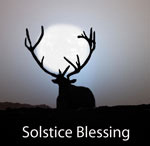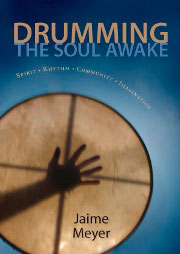 Jaime Meyer’s eclectic background includes earning a Masters' degree in theology and the arts from United Seminary of the Twin Cities and studies with a variety of shamanic teachers. His book Drumming The Soul Awake is an often funny and touching account of his journey to become what some call an urban shaman. Since 2001 he has led popular group drumming events around the Twin Cities including five years of sold-out Winter Solstice ceremonies. Twenty of his plays have been produced in various cities across the USA. He co-founded the first theatre in the world for the Hmong community (a refugee population from Laos and Vietnam) and managed it for ten years, mentoring dozens of writers and scores of actors, and playing to 200,000 Hmong and non-Hmong people in various cities, including in refugee camps in Thailand. The Minneapolis Star Tribune calls Meyer’s writing “…enormously seductive. It’s farfetched whimsy with thickly textured thoughtfulness. It’s like metaphysical cartoons on speed.” Since 1984 Meyer has studied cross-cultural shamanism, mysticism and the spiritual uses of drumming from many cultures. Among others, he has studied with Ailo Gaup, Martin Prechtel and Sandra Ingerman. He has also completed a two-year Celtic shamanism training with Tom Cowan.
Jaime Meyer’s eclectic background includes earning a Masters' degree in theology and the arts from United Seminary of the Twin Cities and studies with a variety of shamanic teachers. His book Drumming The Soul Awake is an often funny and touching account of his journey to become what some call an urban shaman. Since 2001 he has led popular group drumming events around the Twin Cities including five years of sold-out Winter Solstice ceremonies. Twenty of his plays have been produced in various cities across the USA. He co-founded the first theatre in the world for the Hmong community (a refugee population from Laos and Vietnam) and managed it for ten years, mentoring dozens of writers and scores of actors, and playing to 200,000 Hmong and non-Hmong people in various cities, including in refugee camps in Thailand. The Minneapolis Star Tribune calls Meyer’s writing “…enormously seductive. It’s farfetched whimsy with thickly textured thoughtfulness. It’s like metaphysical cartoons on speed.” Since 1984 Meyer has studied cross-cultural shamanism, mysticism and the spiritual uses of drumming from many cultures. Among others, he has studied with Ailo Gaup, Martin Prechtel and Sandra Ingerman. He has also completed a two-year Celtic shamanism training with Tom Cowan.
What has Shaped Me - Notes from Jaime
All of my work is influenced by three streams. One is my life as a playwright. I have luckily learned how to follow my instincts and impulses and try not to ask why certain images arise or why I am compelled to go in a certain direction. My writer’s side urges me to trust the powers that are growling in me, and trust that they want to lead me toward The Beautiful. This has been the greatest gift of my life, to have learned this kind of trust. Of course, it is something that I have to learn again and again, each day, each moment.
Another stream is my 20 years’ fascination with and study of what is popularly called shamanism. Honestly, shamanism is such a poorly defined word, and, especially in middle class white urban American culture, from where I spring, shamanism is a terribly convoluted subject. But after many years of wonderfully torturous questioning, I come back to a definition that was once given to me: a shaman is someone whose shamanic work is effective. It’s not how you dress, or act or the specific gestures in your ritual work. It’s all about whether or not your work works. I use the tools of the trade (drums, rattles, incense, poetry, performance, song, trance, story, dreaming, wonder, humor, misdirection) to, as much as I am able, become a mediator between the human and non-human worlds, to create a healthy, mutually nourishing relationship between the seen and the unseen.
A third stream of influence is my formal, western, academic studies in religion. I went to Seminary for four basic reasons. 1) It was an impulse - certainly to date the most expensive impulse I’ve ever followed. 2) I am in love with the human religious imagination, wanted to study it, and wanted to deepen and refine my own. 3) I wanted to be forced to read mind-numbingly boring, 1800 year-old texts that had absolutely no connection my personal theology. (I thought I was doing this as a way of testing my intellectual and spiritual resolve. It turned out that everything I read was thrilling, even when it was mind-numbingly boring. Everything I read made me love the human religious imagination even more). 4) I thought if I got an advanced degree from the seminary, it would give me a Teflon-like coating and the “New age weirdo” label would not stick. I hope what I do honors ancient and cross-cultural healing traditions, provides nourishment to the unseen forces which permeate our lives, contains a plumb line to perennial wisdom, is aesthetically beautiful and well-done, and most of all, is useful in people’s immediate, modern lives.
In the long and winding hollows of the heart
Where neither sun nor moon,
but only pale amber light, shines
from the long and winding hollows of the heart.
There, rest awhile.
There you may call my name.
And I will come.
And I will come
As quietly
And as gracefully
And as certainly
As the stars are called into the sky
Just after dusk
Coaxes the dreaming eye
Open.
--After a poem originally by William Sharp (aka Fiona Macleod, 1855-1905).
Adapted by Jaime Meyer
© 2002 by Jaime Meyer

